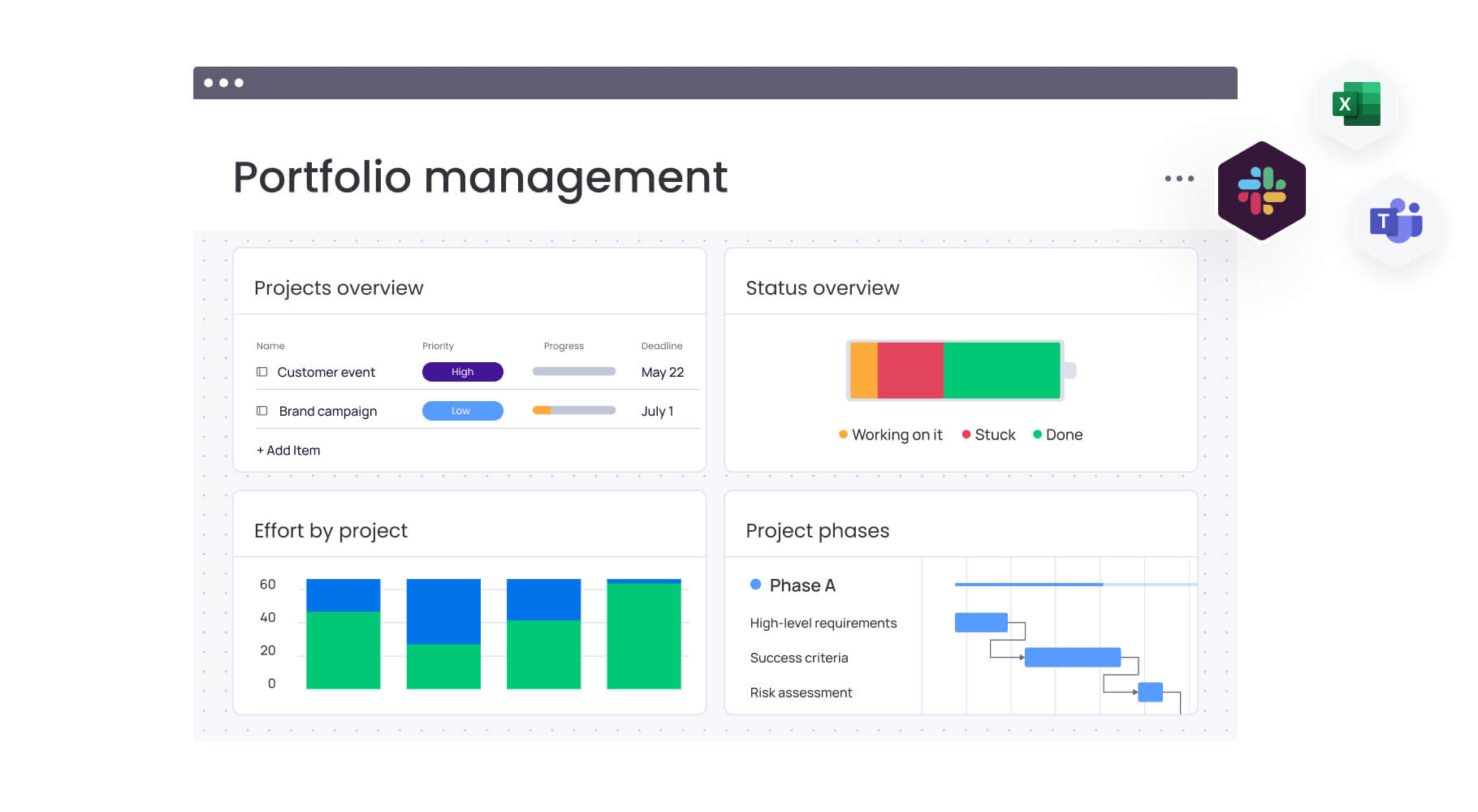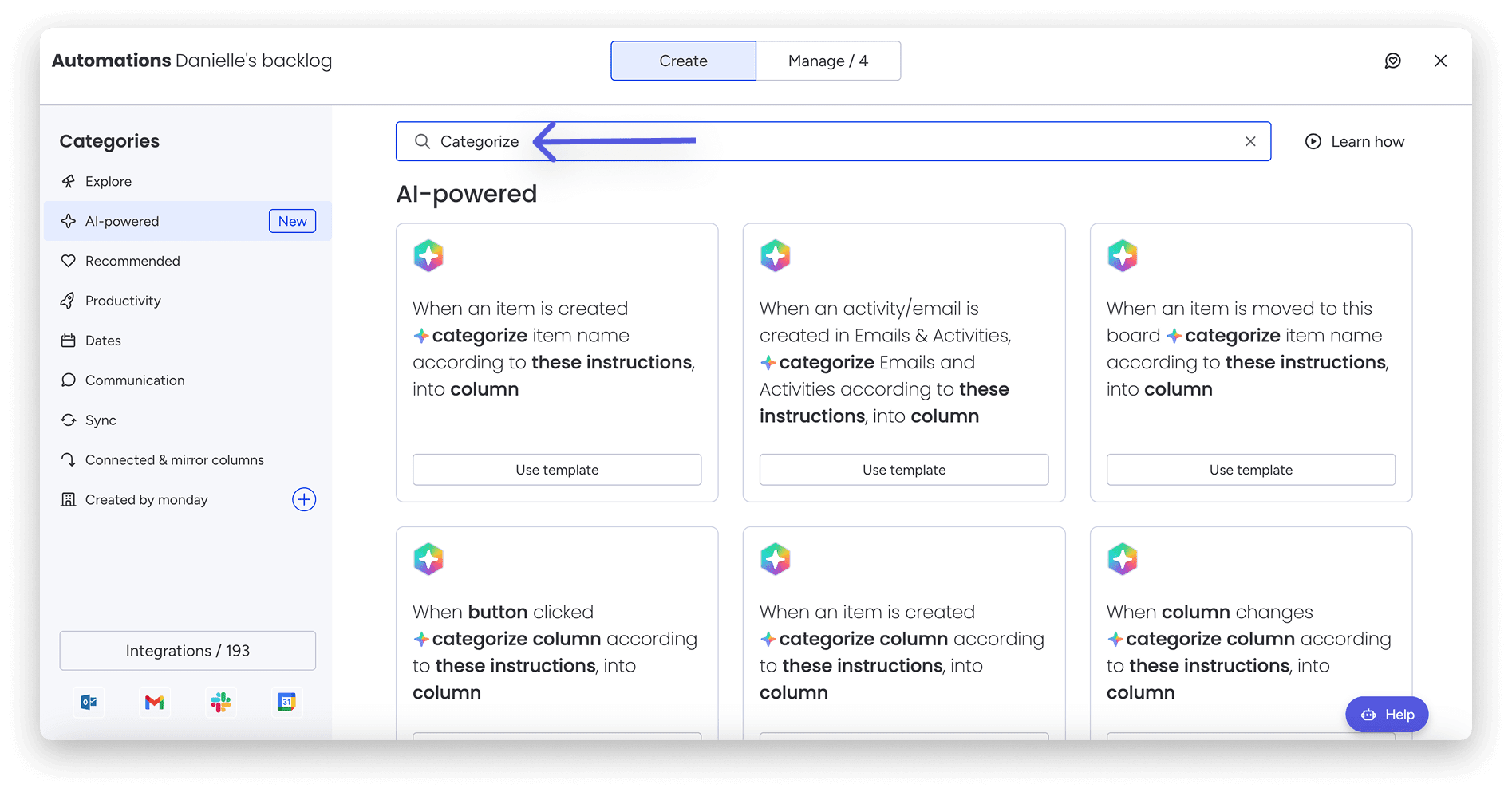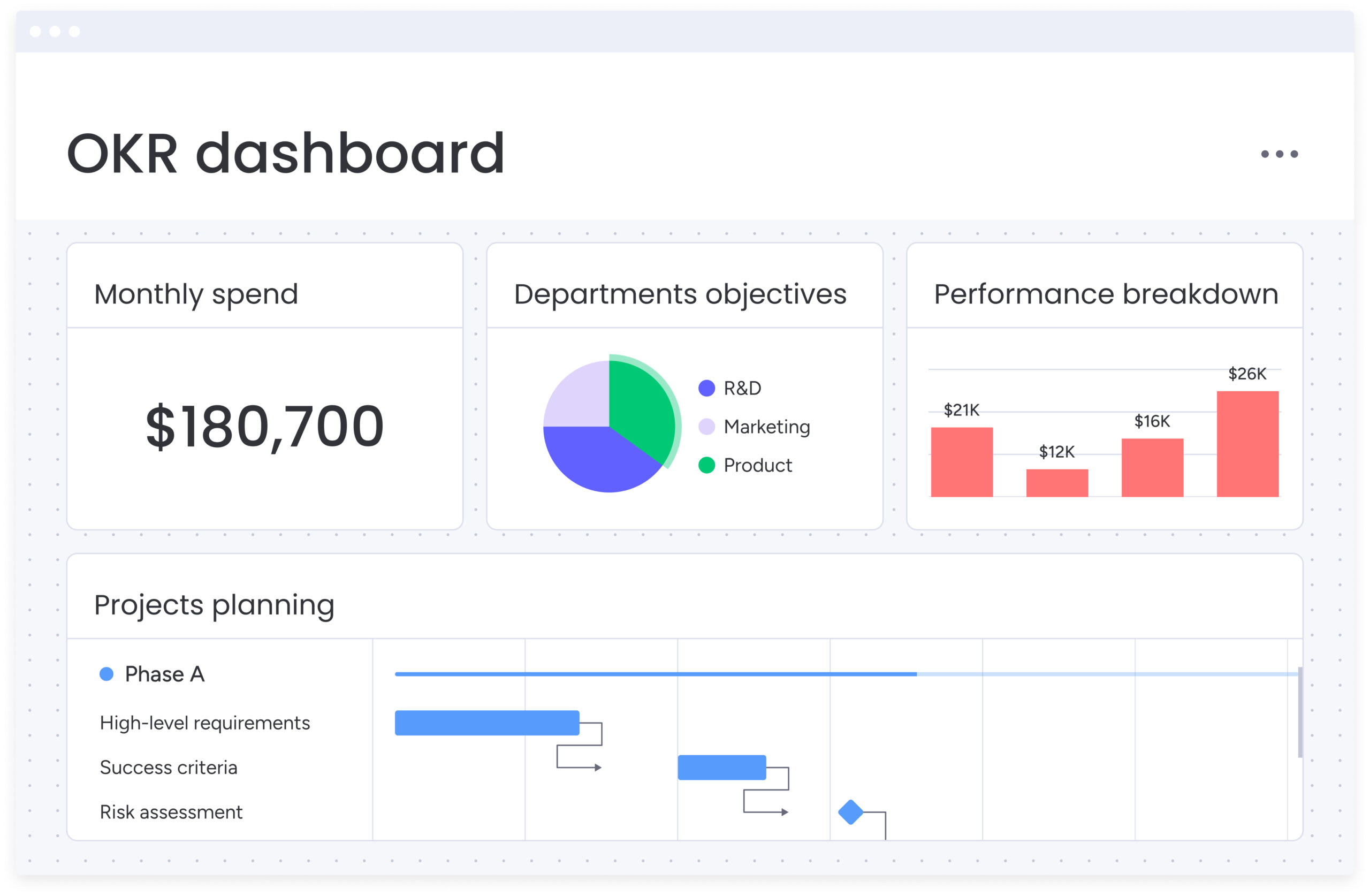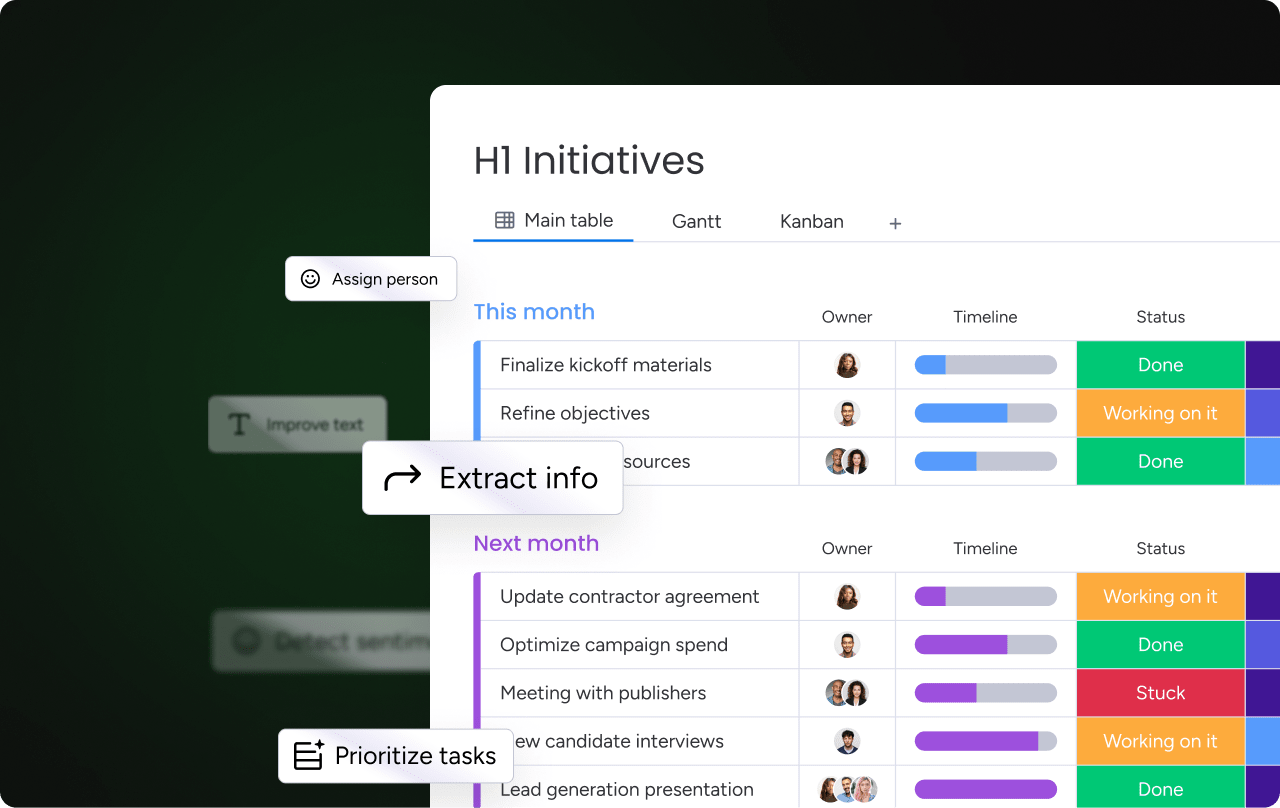In the business world, countless professionals manage projects daily, yet organizations increasingly demand proof of expertise when stakes are high and budgets are substantial.
When executives ask “what is pmp certification,” they’re really asking whether this credential separates genuine project leaders from those who simply coordinate tasks. This guide explores what PMP certification actually validates, why it matters in 2025’s complex business environment, and how certified professionals can maximize their impact.
The most successful PMP-certified professionals don’t just earn the credential, they use platforms like monday work management to turn their validated expertise into measurable business outcomes. This approach drives organizational success and resonates with leadership teams looking for tangible returns.
What is a PMP certification
PMP stands for Project Management Professional — a globally recognized credential issued by the Project Management Institute (PMI). This project management professional certification validates your ability to lead projects, manage teams, and deliver results across any industry or methodology.
When people ask “what is a pmp certification,” they’re referring to the most comprehensive project manager certification available today. The pmi project management professional certification covers traditional, Agile, and hybrid project management approaches, ensuring relevance in diverse project environments.
To define PMP clearly: it’s a certification that demonstrates mastery of three core domains. The People domain focuses on leadership and team dynamics. The Process domain encompasses technical project management skills. The Business Environment domain addresses strategic alignment and organizational context.
PMP certification is accepted in over 200 countries, making it the most widely recognized project mgmt certification worldwide. This universal acceptance opens doors across industries and geographic boundaries.
Why PMP certification matters in modern project management
Organizations increasingly demand proven project management expertise as business complexity grows, especially when research shows that around two thirds of projects fail. The pmp certificate provides that proof by validating your ability to navigate changing requirements, manage diverse teams, and deliver measurable results.
Modern project environments require professionals who can bridge technical execution with strategic objectives. monday work management recognizes this need by providing platforms that support certified professionals in applying their PMP knowledge effectively across complex, cross-departmental workflows — a critical capability when 82% of employees already rely on work/project management software, according to the World of Work Report.
The certification addresses workplace realities where projects span multiple departments, involve remote teams, and require rapid adaptation.
PMP certification requirements and prerequisites
Understanding the requirements for project management professional certification helps you determine your readiness and plan your certification journey. The pmp certification requirements ensure candidates have sufficient real-world experience before attempting the certification.
Two pathways exist for PMP eligibility, each with distinct pmp prerequisites for education, experience, and training. These requirements for pmp certification maintain the credential’s integrity while providing flexibility for professionals from diverse backgrounds.
| Education level | Project management experience | Project management education |
|---|---|---|
| Secondary degree | 60 months | 35 hours |
| Four-year degree | 36 months | 35 hours |
Education and experience criteria
The pmp certification prerequisites require leading and directing projects, not just participating as a team member. Your experience should demonstrate responsibility for project outcomes, team leadership, and stakeholder management across any industry or sector.
Project management professional training for the required 35 hours can come from various sources, and developing a solid training plan helps alleviate common learning roadblocks. These pmp designation requirements include formal courses, workshops, online training, and university classes that PMI recognizes as qualifying education.
Program manager certification PMP overlap
While PMP focuses on individual project management, it provides a foundation for advanced certifications. The distinction between a project manager pmp and program manager certification pmp lies in scope — PMP addresses single projects while PgMP covers multiple related projects as cohesive programs.
Understanding the PMP exam and what you need to know
The pmp exam requirements include 180 questions delivered over 230 minutes in a computer-based format. The exam uses multiple choice, multiple response, matching, and hotspot questions that simulate real-world project scenarios.
Success requires achieving “Above Target” proficiency in all three domains rather than a specific numerical score. This competency-based approach ensures that every certified project management professional demonstrates practical application of project management principles.
Exam structure and format
The exam content emphasizes practical application over memorization. Questions present realistic project situations requiring you to select the most appropriate response based on best practices and professional judgment.
Each domain receives different emphasis reflecting real-world project management priorities. Understanding this structure helps you focus your project management professional online preparation effectively while building confidence for exam day.
PMP certification prerequisites
The application process involves detailed documentation of your education and experience. PMI randomly selects applications for audit, requiring supporting documentation to verify your qualifications and maintain the pmi pmp credential’s integrity.
Effective preparation typically requires 2-4 months of dedicated study. The most successful candidates combine multiple resources and maintain consistent study schedules rather than intensive cramming sessions.
PMP certification cost and fee details
Understanding the total pmp certification cost helps you budget appropriately and maximize your return on investment. The pmp fee structure includes exam costs, preparation materials, and ongoing maintenance requirements.
PMI membership provides significant cost savings that extend beyond the certification process. The membership investment pays for itself through exam discounts while providing ongoing access to professional development resources.
PMP certification fee breakdown
Current pmp certification fee amounts vary based on PMI membership status. Members pay $405 for the exam, while non-members pay $555. PMI membership costs $139 annually, making membership financially beneficial even for first-time test takers.
Additional costs may include preparation materials, training courses, and potential retake fees. Budget $500-$1,500 total depending on your chosen preparation approach and whether you pursue formal project management professional training.
PMP license versus PMP cert clarification
The pmp certificate represents a certification, not a pmp license, which affects how you maintain and use the credential. Certifications validate knowledge and skills through examination and continuing education, while licenses provide legal authority to practice in regulated professions.
This distinction means the p.m.p. certification demonstrates competency without requiring government oversight. The pmp designation maintains its value through PMI’s rigorous standards and ongoing professional development requirements.
5 reasons PMP certification elevates your career
The project management professional pmp certification provides tangible career benefits that extend beyond knowledge acquisition. These advantages position you for advancement opportunities while building professional credibility that organizations value.
Understanding these benefits helps you articulate the value of your certification investment to current and future employers. The certification’s comprehensive coverage creates lasting career advantages across industries and project types.
1. Leadership credibility
The pmp cert demonstrates your leadership capabilities to employers, colleagues, and stakeholders. This credential signals your ability to guide teams through complex projects while maintaining focus on business objectives and organizational success.
2. Salary potential and recognition
According to PMI’s Project Management Salary Survey, pmp professional holders earn approximately 20% more than their non-certified counterparts. This salary premium reflects the value organizations place on proven project management expertise and validated competencies.
3. Access to professional community
Certification connects you to a global network of over one million certified project management professional practitioners. This community provides ongoing learning opportunities, career networking, and access to best practices from diverse industries.
4. Global opportunities
The pmp project management certification’s international recognition facilitates career mobility across countries and industries. Standardized competencies ensure your skills translate effectively regardless of geographic location or organizational culture.
5. Enhanced methodologies
The certification process deepens your understanding of project management methodologies and best practices. This enhanced knowledge improves your ability to handle complex projects and adapt to changing business requirements while delivering consistent results.
Platforms and workflows for PMP project management success
Modern project management requires both certification knowledge and the right digital workspace to implement that knowledge effectively. The most successful certified professionals leverage technology platforms that support their methodologies while enhancing their ability to deliver results.
Choosing the right platform becomes crucial as project complexity increases and teams become more distributed, especially when 57% of employees say the number of software tools they use has grown over the past year, according to the World of Work Report . monday work management provides an ideal foundation for PMP-certified professionals to apply their knowledge across complex, cross-departmental workflows.
monday work management advantages
monday work management supports all three PMP domains through integrated features that address people, process, and business environment requirements. The platform’s portfolio management capabilities enable certified professionals to oversee multiple projects while maintaining visibility into resource allocation and risk factors.

Key capabilities that amplify PMP expertise include:
- Workflow automation that standardizes processes according to best practices

- Dashboard reporting that provides real-time insights for stakeholder communication. This is critical when about 90% of project management is communication

- AI-powered features that categorize project data at scale.

The combination of PMP knowledge and advanced platform capabilities creates exponential value for organizations seeking to elevate their project success rates.
monday work management’s 200+ integrations connect your PMP methodologies with existing business systems, creating seamless workflows that support enterprise-grade project management at scale.
Maintaining and renewing your PMP credential
PMP certification requires ongoing maintenance through Professional Development Units (PDUs) to ensure your knowledge remains current with evolving best practices. This requirement reflects the dynamic nature of project management and the need for continuous learning.
The renewal process involves earning 60 PDUs every three years through various professional development activities. These activities must align with PMI’s talent triangle, covering technical project management, leadership, and strategic business management skills.
Understanding PDU categories helps you plan your professional development strategically while maximizing the value of your learning investments:
- Education PDUs: Formal learning through courses, conferences, webinars, and self-directed study related to project management or complementary skills
- Giving back PDUs: Volunteer activities that contribute to the project management profession, such as mentoring, writing articles, or speaking at events
- Working as a practitioner PDUs: Applying project management skills in your professional role, with automatic PDUs awarded for maintaining active practice
Moving forward with strategic impact
The project management professional pmp certification validates your expertise while opening doors to advanced career opportunities and increased earning potential. This credential’s global recognition and comprehensive coverage of modern project management practices make it a valuable investment in your professional future, with global initiatives like Onward to Opportunity highlighting the demand for project management certifications .
Success with PMP certification extends beyond passing the exam to applying your knowledge effectively in real-world situations. The right combination of certification knowledge and digital platform capabilities enables you to deliver exceptional results while building your reputation as a trusted project leader.
Ready to elevate your project management capabilities and maximize your organizational impact? With monday work management you can experience how the right platform transforms certified expertise into measurable business outcomes that drive strategic success.
FAQs
What does PMP certification actually validate for project managers?
PMP certification validates that project managers possess the knowledge, skills, and competencies to lead projects successfully across any industry, methodology, or geographic location through comprehensive examination of people, process, and business environment domains.
How much does PMP certification cost including all associated fees?
PMP certification costs $405 for PMI members or $555 for non-members, with PMI membership costing $139 annually, plus additional expenses for preparation materials and training that typically range from $500-$1,500 total.
What are the specific PMP certification requirements for eligibility?
PMP certification requirements include either a four-year degree with 36 months of project management experience or a secondary degree with 60 months of experience, plus 35 hours of project management education from PMI-approved sources.
Is PMP certification worth the investment for career advancement?
Yes, PMP certification is worth the investment as certified professionals earn approximately 20% more than non-certified counterparts according to PMI salary surveys, while gaining access to global career opportunities and professional networks.
How long does it typically take to prepare for the PMP exam?
Most candidates require 2-4 months of dedicated study to prepare for the PMP exam, depending on their existing project management experience, available study time, and chosen preparation methods including formal training or self-study approaches.
What happens if someone fails the PMP certification exam?
If someone fails the PMP exam, they can retake it up to three times within their one-year eligibility period, with required waiting periods between attempts and additional fees for each retake attempt.
